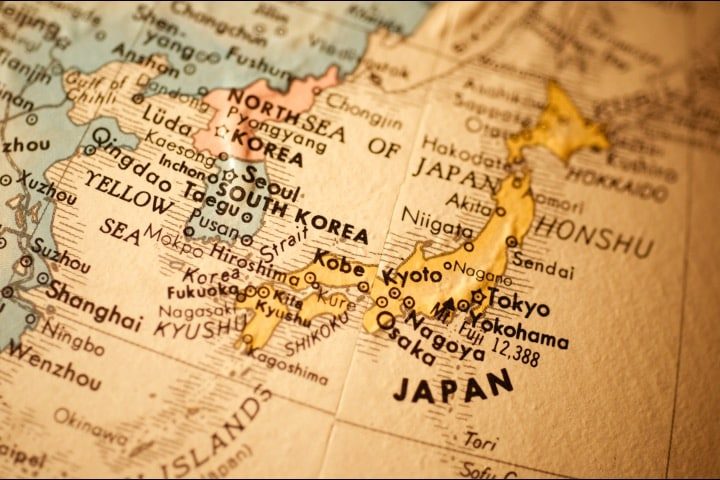
In March this year, South Korean President Yoon Suk Yeol met his Japanese counterpart, Prime Minister Fumio Kishida, at the latter’s official residence in Tokyo in their first bilateral summit in 12 years. Both leaders described their meeting as a kind of springtime, after prolonged years of strained relations.
“This week, as the cherry blossoms bloomed in Tokyo,” Kishida told reporters, “we welcomed the president of South Korea to Japan for the first bilateral visit to Japan in about 12 years after going through a long winter.”
During the meeting, Yoon and Kishida agreed to reboot reciprocal visits and security dialogues, as well as to resolve trade disputes that emerged in 2019. Both leaders also agreed to normalize an intelligence-sharing deal, which South Korea had earlier threatened to ditch.
The March summit signified an attempt by both Yoon and Kishida to gloss over historical grievances and domestic politics to fend off China and North Korea.
While Tokyo and Seoul restarted bilateral ties in 1965, the ties have been characterized as “a cold peace,” with various diplomatic moves failing to address deeply entrenched animosities as a result of Japan’s occupation of the Korean Peninsula between 1910 and 1945. Points of bilateral contention include the forced sexual slavery of Korean women in Japanese military brothels, as well as territorial disputes over a group of islets in the Sea of Japan, which are controlled by Seoul but claimed by Tokyo.
It was South Korea’s Yoon who first extended a conciliatory hand by suggesting a solution to the animosity dating back over a hundred years, when around 780,000 Koreans slogged as forced laborers in mines and factories under Japanese colonial rule. In various 2018 rulings, South Korea’s Supreme Court unsuccessfully demanded that two Japanese companies compensate their former laborers, while the firms involved argued that grievances had been settled when Seoul and Tokyo rebooted diplomatic relations in 1965.
However, Yoon suggested instead that a public foundation, funded by voluntary donations from South Korean and possibly Japanese companies, would compensate the victims and their families. Kishida greeted Yoon’s idea as an indication of a “return to a healthy relationship between Japan and South Korea.”
Yoon also declared that collaboration with Japan was vital to addressing increasing threats from North Korea, and to protecting global supply chains. “There is an increasing need for Korea and Japan to cooperate in this time of a polycrisis, with North Korean nuclear and missile threats escalating and global supply chains being disrupted,” Yoon said. “We cannot afford to waste time while leaving strained Korea-Japan relations unattended.”
Besides addressing North Korea, both Seoul and Tokyo must also deal with China’s rising economic and military clout. “Both Korea and Japan also have close economic ties with China respectively,” Yoon said. “I believe that strengthening Korea-Japan cooperation will help our two countries advance economic relations with China in a stable manner.”
U.S. President Joe Biden welcomed the improved ties as a “groundbreaking new chapter” between both countries, as long-standing regional feuds have impeded Washington’s efforts to present a united front against China and North Korea.
“If relations [between Tokyo and Seoul] improve as a result, this may also pave the way for improved trilateral cooperation between the United States and its two regional allies in Northeast Asia, and facilitate diplomatic discussions on regional economic and security issues,” Amy Chang, a former Harvard Belfer Center non-resident fellow, told The China Project.
Beijing has been on the alert amid the improved relations between Tokyo and Seoul, given that both East Asian countries are also U.S. allies. Enhanced Japan-South Korea ties would give the U.S. more influence in the region in light of rising Sino-U.S. tensions.
Chang noted that the threat from China overshadows the historical issues between Japan and South Korea:
From the South Korean government’s perspective, they deem regional security in the face of an assertive China as trumping historic tensions between South Korea and Japan. South Korean President Yoon’s recent steps to address historic wrongs committed by Japan’s colonization indicate cautious first steps to mending ties between the two countries. The two countries’ leaders’ first bilateral meeting in twelve years later this week is also a notable development in this recent thaw.
Chinese state-controlled tabloid Global Times previously lambasted Seoul’s diplomatic maneuvers with Tokyo. In an op-ed, the paper slammed Seoul for “sleepwalking” and cautioned it against being a “pawn” of America.
Although South Korean officials have dismissed claims that they were pressured by the Biden administration to improve ties with Tokyo, such moves have been part of a wider attempt to address Seoul’s rivalry with China and fend off North Korea’s missile pugilism.
Additionally, Seoul indicated that it hopes to “proactively accelerate” its involvement in the Quadrilateral Security Dialogue (QSD), the American-led security group typically known as the Quad. China deems the Quad a provocative gesture aimed at undermining its regional clout.
That being said, Yoon’s diplomatic niceties do not sit well with certain South Koreans back home. While these people are concerned about escalating threats from China and North Korea, they hope to work with Japan without having to overlook past injustices and grievances with Tokyo. Some of these people think that Seoul has gone a tad too far to win Tokyo over to its side, whereas Tokyo has not given Seoul any significant concessions with regard to historical disputes.
“The Yoon Suk Yeol government is so anxious for the diplomatic achievement of mending relations with Japan that it is forcing an unfair choice upon the victims, telling them to take donations, not compensation,” lamented Kim Young-hwan with the Center for Historical Truth and Justice, a Seoul-based civic group.
“The visit of President Yoon to Japan is a recognition of the failure to reach an agreement” with Tokyo, argues Daniel Sneider, a Stanford University expert on U.S. foreign policy toward Asia. Japan’s unflinching position means that South Korea’s concessions are essentially unilateral, Sneider said cynically, “and they’re hoping at some point the Japanese will join in. There’s no evidence that the Japanese will do that.”



